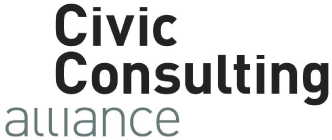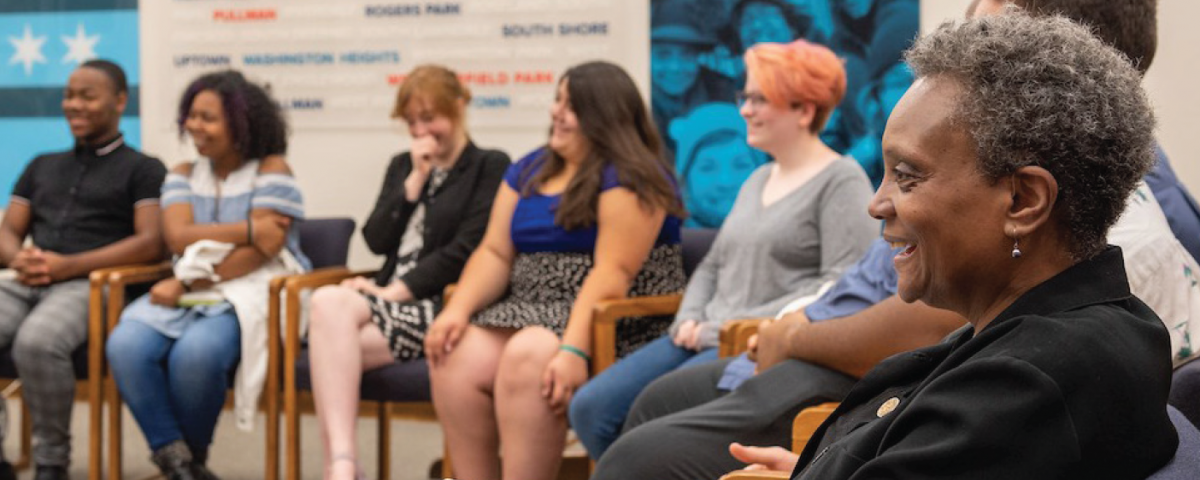
Accelerating Chicago’s mayoral transition
Fellow Spotlight: Natalie Griffin
June 1, 2019
Implementing a Vision for Community Policing
August 1, 2019Accelerating Chicago’s mayoral transition

Download a PDF of our case study here.
Introduction
Over the past century, Chicago has only had four Mayoral elections without an incumbent on the ballot. Given this history, the 2019 Mayoral transition was a rare transfer of leadership—and a chance to accelerate progress in addressing our city’s challenges and to capture exciting opportunities.
But the transition was also a strategic and logistical challenge. It was the first time that a newly elected Mayor had to prepare to lead the City and sister agencies—a $20 billion enterprise—in less than seven weeks, between the runoff election on April 2nd and the inauguration on May 20th.
Recognizing that this transition would impact all Chicagoans and the region for years to come, Civic Consulting Alliance stepped up to ensure a smooth transfer of power from day one of the new Mayor’s term. With the help of more than 20 pro bono partners and the support of several local corporate and foundation funders, our team prepared for and helped to execute this first-of-its-kind transition in four phases.
Phase 1 – Planning (September 2018)
Given the large number of candidates (14 total) running for Mayor in 2019, many predicted that there would be a runoff election. Accordingly, in fall 2018, Civic Consulting Alliance and our partners began to prepare for a compressed Mayoral transition by outlining a framework and a high-level plan with milestones to guide the transition process, and to secure necessary pro bono and staff resources.
Lessons Learned: Start early, plan in detail, be flexible, execute on time.
Phase 2 – Pre-General Election (October 2018 – February 26, 2019)
With a plan in place, Civic Consulting Alliance set to work on the second phase of the work. The scope of the City of Chicago Office of the Mayor is tremendous, and the Office impacts almost every aspect of Chicagoans’ daily lives—from education to public safety to health to transportation. Civic Consulting Alliance developed tools that would provide the Mayor’s team a foundational understanding of the City’s many departments and agencies, and of strategic options it might consider within specific issue areas. These tools included:
- Fact Base: Civic Consulting Alliance developed a one-page summary of each of the roughly 110 agencies and departments under direct or indirect Mayoral control grouped into nine issue areas, developing an aggregated summary of each issue area’s current strategic vision, finances, and leadership. This structure allowed the fact base to serve as both a high-level and an in-depth resource throughout the transition process.
- Strategic Options: Through subject matter expert interviews and analysis, Civic Consulting Alliance and our partners compiled strategic options (non-partisan summaries of potential opportunities and challenges across the nine issue areas) for the incoming Mayoral administration to consider. This included a financial analysis of the City of Chicago and its sister agencies, which was a particularly critical resource for the new Mayor’s first 100 days in office.
Lessons Learned: Know the facts, outline non-political strategic options (you’ll need them later).
Phase 3 – Pre-Runoff Election (February 27 – April 2, 2019)
Starting on February 27th, the day after the general election, Civic Consulting Alliance and pro bono partners began work with non-political designees from runoff candidates Lori Lightfoot and Toni Preckwinkle. While the runoff campaigns were in full swing, both transition teams began quietly to prepare, utilizing our Fact Base and Strategic Options to create detailed operational plans in anticipation of an accelerated transition period. These plans included:
- A plan for sourcing, recruiting, screening, and hiring key personnel;
- Structure and processes for issue-focused external transition committees that could engage residents broadly;
- A process for moving from electoral to governing policy priorities;
- A plan for briefings from the outgoing administration; and
- An overall program management approach to execute the transition, including values to guide every aspect of the transition and administration.
Throughout this period, we worked with both transition teams, ensuring that each was offered identical support. As the April 2nd runoff election drew closer, we met with both teams nearly
daily—a logistical and organizational challenge that required careful attention to detail.
Lessons Learned: Maintain confidentiality and professionalism even under pressure.
Phase 4 – Transition (April 3 – May 20, 2019)
At 10 AM on April 3rd, the day after the runoff election, the Mayor-elect, her transition team, Civic Consulting Alliance, and 20 pro bono partners hit the ground running, kicking off the transition
sprint with an operational plan in place.
Together with our pro bono partners, Civic Consulting Alliance and the Mayor’s senior staff managed four components of the transition work:
- Transition Team Management: Established, managed, and dismantled a transition team to drive the transition forward.
- People Process: Developed recommendations for the Mayor’s Office’s organizational structure and process for sourcing and screening potential leadership.
- Policy: Developed first-term, first-year, and first 100 days functional priorities.
- Transition Committees: Gathered and synthesized input from more than 400 Chicagoans on 10 committees across policy areas, producing a transition report that was released three days before the inauguration.
Lessons Learned: Planning is good. Execution is paramount.
Results:
As a result of the hard work of Civic Consulting Alliance’s staff, our pro bono partners, and both runoff candidates’ transition teams, as well as the support of our generous funders, on May 20th, 2019, Lori Lightfoot took office as Chicago’s 56th Mayor with a plan in place.
Despite the brief seven week transition period, Mayor Lightfoot began her term with:
- 75% of her senior team in place;
- 100-day policy and functional priorities established;
- Interviews of outgoing administration staff from nearly 30 City departments and sister agencies
completed; and - Input from over 400 Chicago residents deeply engaged through 10 diverse, issue-focused
transition committees—all summarized in a 110 page report of recommendations. - She was—as much as anybody could be—ready to pick up the mantle as Mayor of the City of Chicago.
“Civic Consulting Alliance did a yeoman’s job in helping to set up our transition office, source talent, and really keep us on track. They’re an invaluable resource for our city.”
— Lori Lightfoot, Mayor, City of Chicago
Thank you to our Funding Partners:

